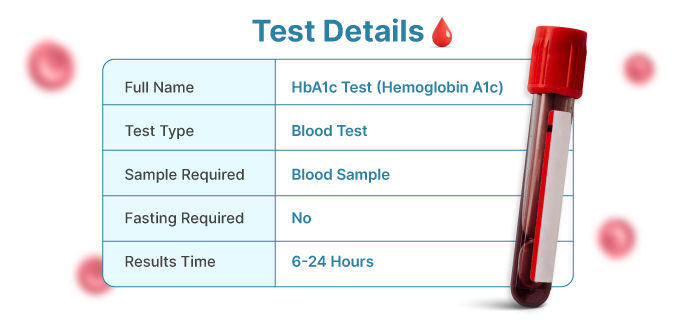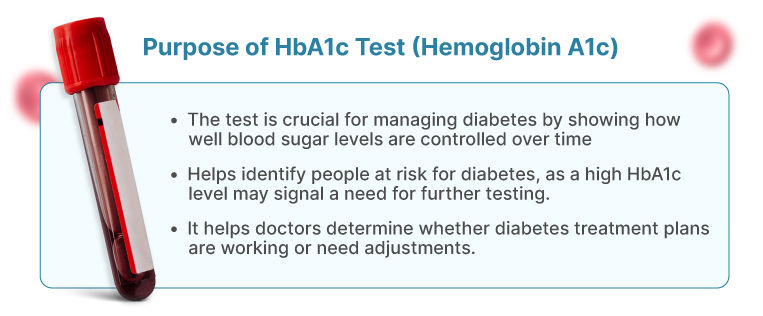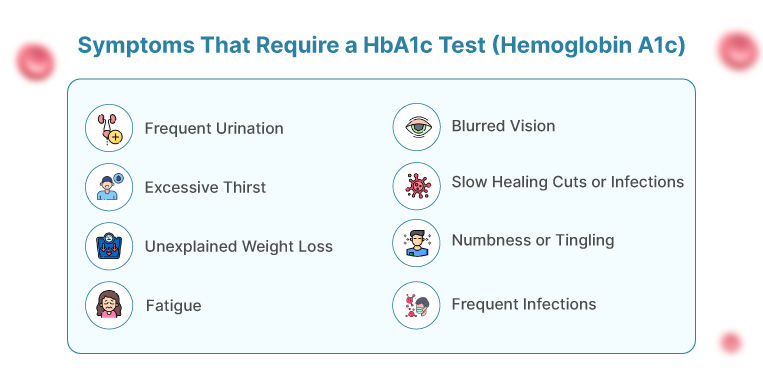HbA1c Test (Hemoglobin A1c)
No preparation required
 Tests Included (3)
Tests Included (3)
- HBA1C (GLYCATED HEMOGLOBIN)
3 tests included
About

BLOOD

Both

7 years & above
HbA1c Test - Price, Purpose, Range & Reports
Test Overview
| Sample Type | Blood |
| Reports Delivery | Earliest reports available within 10 hours |
| Price/Cost | ₹649 |
| Number of Tests Included | 3 |

What is a Glycated Haemoglobin (HbA1c) Test?
The glycated haemoglobin test, commonly known as the HbA1c test, is a crucial diabetes test that doctors recommend to track blood sugar control over time in individuals with diabetes. It is a simple HbA1c blood test that provides a comprehensive view of your average blood sugar levels over the past two to three months, unlike regular blood sugar tests that reflect levels at a single point in time.
Here are a few important pointers to understand what HbA1c test means:
The HbA1c test measures how much glucose is attached to haemoglobin – the protein in red blood cells that carries oxygen throughout your body. This helps give a reliable picture of how well your blood sugar has been managed.
This blood sugar test HbA1c is vital in managing diabetes, as it shows how effectively your treatment plan is working over weeks. Whether you refer to it as the hb1ac test, hb1c test, or Hba1c test, the purpose remains the same, offering insights into your long-term blood sugar control.
People living with diabetes should get this test done regularly, following their doctor's advice, to assess their treatment’s success and make any necessary adjustments. The HbA1c test range also helps doctors determine if changes in medication, lifestyle, or diet are needed.
If you’re planning your next health check-up and looking for an HbA1c test price near me or want to know the hb1ac test price, there are many diagnostic centres offering this essential HbA1c test at affordable rates. Understanding the HbA1c cost and reviewing your HbA1c test report with your doctor can help you take proactive steps towards better diabetes management and overall health.
What is the Glycated Haemoglobin (HbA1c) Test Price?
The price for this test can vary based on several factors. Some of these factors include:
HbA1c Test Price in Different Cities
| City | HbA1c Test Price |
| Bangalore | ₹763 |
| Hyderabad | ₹763 |
| Chennai | ₹763 |
| Gurgaon | ₹638 |
| Delhi | ₹638 |
- Test City: Prices differ across different cities in India. The HbA1c test cost might be slightly higher in cities like Mumbai or Bangalore than in smaller cities or towns due to the high cost of living and operational expenses. You can always check the price across diverse cities to find an option that suits your budget.
- Demand for the Test: The demand for HbA1c blood tests can also influence the price. Higher demand may lead to a slight increase in prices and vice versa.
- Comprehensive Add-Ons: Some laboratories offer comprehensive packages that include the HbA1c test as part of an overall health check-up. These comprehensive packages are generally more cost-effective than opting for individual tests. Also, extra services like post-test consultation with a doctor, home sample collection, and quick report generation could affect the HbA1c test price.
- Laboratory Type: The reputation and quality standard of the laboratory conducting the test also affects the price. Premium laboratories might charge more, but they usually offer superior service and accuracy in their results.
- Discounts and Promotions: Keep an eye out for discounts and promotional offers. Many laboratories offer attractive discounts on their health packages from time to time, especially during festive seasons or health awareness months.
Apollo 24|7's HbA1c test cost is very competitive and will offer you complete value for your money. While it's vital to be mindful of the HbA1c test price, it's equally important to not compromise on the quality of your healthcare. Remember that timely investment in preventive health check-ups like the HbA1c blood test can save you from expensive treatments in the long run.
What is the Purpose of the Glycated Haemoglobin (HbA1c) Test?

The HbA1c, Glycated Hemoglobin purpose varies across various health scenarios:
- Diagnosis of Diabetes: First and foremost, the HbA1c test is used for diagnosing diabetes. If your doctor suggests you get an HbA1c blood test, it usually means he or she wants to check if you have prediabetes or diabetes.
- Treatment Monitoring: It also plays an important role in monitoring your diabetes. If you are already diagnosed with diabetes, the HbA1c test can monitor your sugar levels over the past two to three months, helping your doctor adjust your treatment plan if needed.
- Other Health Conditions: The HbA1c test is also used to predict potential health complications associated with diabetes. A high HbA1c level in the blood can indicate an increased risk of complications such as heart disease, stroke, and kidney problems.
Who Should Get a Glycated Haemoglobin (HbA1c) Test Done?

So, who should consider taking this crucial test? The following is a group of people who should prioritise getting this test done:
- People with Diabetes: If you are a diabetic patient, regular HbA1c blood tests are paramount. They provide a clear picture of how well your blood sugar levels have been managed over the previous few months. Even if you routinely perform home glucose monitoring, the HbA1c test can tell you more about your overall control.
- Pre-Diabetic Individuals: If your doctor has told you that you're at risk of developing diabetes due to factors like obesity or family history, getting an HbA1c test is a good idea. It will give an accurate baseline to monitor changes in your blood sugar over time.
- People with Unexplained Symptoms: If you've been experiencing unexplained fatigue, frequent urination, excessive thirst or sudden weight loss, it might be worth considering an HbA1c blood test. These are often signs of high blood sugar levels and could indicate undiagnosed diabetes.
- Regular Health Check-up: Even if you don't fall into any of the above categories, getting a routine Hba1c test during your annual health check-up can be beneficial. It helps in the early detection and prevention of diabetes.
Components of a Glycated Haemoglobin (HbA1c) Test
The glycated haemoglobin (HbA1c) test is a comprehensive assessment offering valuable insights into your average blood sugar levels over several weeks. This test consists of three major components:
- HbA1c, Glycated Haemoglobin: This is the foremost part of the test and is used to measure the amount of sugar (glucose) attached to haemoglobin in your red blood cells. The higher the HbA1c, the greater your risk of developing complications from diabetes.
- Estimated Average Glucose (EAG): This component translates the HbA1c reading into a daily blood glucose level. It can give you an idea of what your average blood glucose level was for the past few months.
- Comments (Optional): This section is optional but it provides a space for any additional notes or observations that may be helpful for your doctor to understand your condition better.
Understanding Glycated Haemoglobin (HbA1c) Test Report
Glycosylated hemoglobin normal range, borderline range and high range are as follows:
| Parameter | Normal Range | Borderline Range | High Range |
| HbA1c, Glycated Haemoglobin | < 5.7% | 5.7% to 6.4% | 6.5% or higher |
| Estimated Average Glucose (EAG) | < 117 mg/dl | 117–137 mg/dl | 137 mg/dl or higher |
Note: These values may vary slightly depending on the laboratory, age, sex, and underlying conditions. Also, the 'Comments' component was not included in the table above as these are optional; testing of these is conditional depending on the results of other tests.
HbA1c, Glycated Haemoglobin
| High values may indicate | Low values may indicate |
| Poor blood sugar control over the preceding months Increased risk of diabetes-related complications | Low blood sugar levels Increased risk of hypoglycaemia-related complications |
Estimated Average Glucose (EAG)
| High values may indicate | Low values may indicate |
| Poor blood sugar control over the measured period Uncontrolled diabetes Increased risk of diabetes-related complications like nerve damage, kidney disease, cardiovascular problems, and eye issues | Low blood sugar levels Increased risk of hypoglycaemia-related symptoms like dizziness, confusion, and sweating |
Preparation and Procedure for Glycated Haemoglobin (HbA1c) Blood Test

Before undergoing the blood test, it's crucial to understand the test. HbA1c, glycated hemoglobin preparation and procedure are involved in ensuring accurate results. You will learn how to prepare for the test in the following subsections.
How is the Glycated Haemoglobin (HbA1c) Test Done?
The HbA1c test is conducted in the following manner:
HbA1c, glycated hemoglobin preparation:
- Generally, there's no specific preparatory measure required for the HbA1c blood test.
- Unlike other medical tests, there is no need to fast or alter your diet before getting this blood test.
- However, it's always better to discuss with your doctor if you are taking any medication or have any existing health conditions or allergies, as they may interfere with the test results.
HbA1c, glycated hemoglobin procedure:
- The lab assistant will ensure you are comfortable before starting the procedure.
- A band is wrapped tightly around your upper arm to make your veins more visible.
- After cleaning the intended area with an antiseptic, a needle is inserted into a vein by the doctor.
- Blood is drawn into a tube attached to the needle.
- Once sufficient blood is collected, the needle is withdrawn.
- The puncture site is covered with a small gauze pad or cotton ball to stop bleeding.
- The collected blood sample is then sent to the lab for analysis.
Is Fasting Required for a Glycated Haemoglobin (HbA1c) Test?
One comforting aspect of this test is that fasting is not required! Unlike some other blood tests, you don't need to abstain from eating or drinking for a certain period before this test. The HbA1c test measures how your body has managed your blood sugar over an extended period, so short-term changes like fasting don’t impact the results.
What Time of the Day Should I Undergo a Glycated Haemoglobin (HbA1c) Test?
There's no specific time of the day that's best time for HbA1c test. It can be done at any time that suits you as it doesn't require fasting.
Booking Glycated Haemoglobin (HbA1c) Test Online and Checking Reports
Scheduling and reviewing an HbA1c test can be done conveniently from the comfort of your home, thanks to digital advancements within the healthcare sector. Here's how you can book your test on Apollo 24|7.
What are the Steps to Schedule a Glycated Haemoglobin (HbA1c) Test on Apollo 24|7?
The steps to schedule an HbA1c test on Apollo 24|7 are straightforward:
- Log into Apollo 24|7: Start by logging into your account on the Apollo 24|7 website. If you don't have an account, it's easy to create one.
- Search for the Test: Once logged in, search for 'HbA1c Test' or 'HbA1c Test near me' in the search bar.
- Book the Test: You'll see various options related to the HbA1c blood test. Click on the desired option to get details about the HbA1c test price and other information. Then, click 'Book Now'.
- Enter Details: Provide details like name, contact information, and preferred date and time for sample collection.
- Confirm Booking: Review all details and confirm your booking by proceeding with payment.
How Do I Access My Glycated Haemoglobin (HbA1c) Test Results Online on Apollo 24|7?
You will receive an SMS/email notification when your test reports are ready. You can check your reports by following these steps:
- Log into Apollo 24|7.
- Go to the 'My Reports' section.
- Click on the HbA1c Test report to view it.
In case there are any abnormalities or if your results fall outside the normal range, a consultation with a doctor is advised. However, if all is well and within normal ranges, continue with a healthy lifestyle.
Remember, regular monitoring of your HbA1c levels is essential if you have diabetes. This important diabetes test shows your average blood sugar control over the last two to three months, providing a clear picture of your health. Understanding what the HbA1c test means can empower you to take control of your condition. By reviewing your HbA1c test report, your doctor can curate a personalised treatment plan to better manage your diabetes. Whether you refer to it as the hb1ac test, hb1c test, or HbA1c blood test, keeping track of your results is key. With online booking options now available, it’s easy to schedule this vital test from the comfort of your home. Simply search for HbA1c test price near me or check the HbA1c cost to find affordable options and ensure you never miss a check-up. Regular testing based on your HbA1c test range can make a significant difference in your diabetes management journey.
 Frequently Asked Questions (FAQs)
Frequently Asked Questions (FAQs)
If my glycated haemoglobin (HbA1c) blood test results are positive, what are the next steps?
If your blood sugar test hba1c result is positive, it indicates higher than normal blood sugar levels, a sign of diabetes. You should immediately consult your doctor who can guide you on the next steps based on your overall health profile. You may also need to implement regular exercise, healthy eating habits, weight management, and stress reduction to help manage blood sugar levels effectively.
Are there any alternative or complementary tests to consider alongside a glycated haemoglobin (HbA1c) test for a more comprehensive assessment?
Yes, doctors often recommend a HbA1c, glycated hemoglobin test list for comprehensive diabetes monitoring. These include fasting blood sugar (FBS) and postprandial blood sugar (PPBS) tests. These tests measure your blood sugar at different times to provide a clearer picture of how your body manages glucose.
Are there any emerging technologies or advancements in glycated haemoglobin (HbA1c) testing that I should be aware of?
Continuous advances are being made in medical technology to make HbA1c testing easier and more accurate. These include home-based testing kits and devices that can provide instant readings.
Can I drink water before the glycated haemoglobin (HbA1c) test?
Yes, unlike some tests that require fasting, you can drink water before a blood sugar test hba1c.
How accurate is the glycated haemoglobin (HbA1c) test for diagnosing type 2 diabetes mellitus?
The HbA1c test is well-regarded for its accuracy in diagnosing type 2 diabetes. However, results of glycated Hb test may vary based on factors such as age, pregnancy, and certain health conditions.
What is the age limit for an HbA1c test?
There's no specific age limit. However, it's typically recommended for adults, especially if they have risk factors for diabetes.
How long does it take for an HbA1c, glycated hemoglobin test report to generate?
The time taken to generate a blood sugar test hba1c report can vary between labs. Generally, it may range from a few hours to a few days post-testing.
What is an HbA1c test?
The HbA1c test measures the average blood sugar levels over the past 2-3 months to assess how well diabetes is managed.
What is the difference between a glucose test and an HbA1c test?
A glucose test measures your current blood sugar level at the moment of testing, providing a snapshot of your immediate blood sugar. In contrast, an HbA1c test reflects your average blood sugar levels over the past 2 to 3 months, giving a broader picture of long-term glucose control and diabetes management.
Is fasting required for the HbA1c test?
No, fasting is not required for the HbA1c test as it reflects long-term glucose levels, not immediate levels.
What is HbA1c Test Price?
The price of an HbA1c test typically ranges from Rs 763 to Rs 638, depending on the healthcare provider, location, and whether the test is done at a private or government facility. Factors like additional consultation fees or the type of laboratory may also influence the overall cost of the test.
Can the HbA1c test diagnose diabetes?
Yes, the HbA1c test can diagnose diabetes. An HbA1c level of 6.5% or higher indicates diabetes, while levels between 5.7% and 6.4% suggest prediabetes, and levels below 5.7% are considered normal.
What is the use of the HbA1c test?
The HbA1c test is primarily used to monitor long-term blood sugar control in individuals with diabetes. It helps assess how well diabetes management strategies, such as diet and medication, are working over the past 2-3 months. Additionally, it can be used to diagnose diabetes and prediabetes.
Is the Hba1c test reliable?
Yes, the HbA1c test is reliable for long-term monitoring of blood sugar, though it may not be accurate for people with certain conditions.
Is the Hba1c test done for insulin resistance?
The HbA1c test can provide some indication of insulin resistance, though other tests like the fasting insulin test may be more direct.
When to get the Hba1c test?
The test is typically done every 3 to 6 months for people with diabetes or those at risk of developing diabetes.
Where to get the Hba1c test?
The test can be done at most healthcare clinics, hospitals, and laboratories.
Why is the Hba1c test important?
The HbA1c test is important because it provides a long-term view of blood sugar control, helping to assess the effectiveness of diabetes management. By tracking average glucose levels over 2-3 months, it helps detect potential risks of complications and allows for timely adjustments in treatment to improve overall health.
Can the HbA1c test be used in children?
Yes, the HbA1c test can be used in children to diagnose and monitor diabetes, particularly for Type 1 and Type 2 diabetes. It helps assess how well blood sugar levels are being controlled over time and is a useful tool in managing the condition in pediatric patients.
General Physician/Internal Medicine
Book Popular Tests at Home
Hba1c (glycated Hemoglobin) | Cholesterol - Serum | Complete Urine Examination (cue) | Glucose, Fasting | Glucose, Random | Creatinine - Serum | C-reactive Protein (crp) - Quantitative | Culture And Sensitivity - Urine (automated) | Prothrombin Time (pt/inr) | Erythrocyte Sedimentation Rate (esr) | Beta Hcg (total) | Uric Acid - Serum | Electrolytes - Serum | Urea And Creatinine | Blood Group Abo And Rh Factor | Ferritin | Vitamin B12 | Hbsag Screening - Rapid | ProlactinBook HbA1c Test (Hemoglobin A1c) Test in Other Cities
Hba1c Test (hemoglobin A1c) in Delhi | Hba1c Test (hemoglobin A1c) in Noida | Hba1c Test (hemoglobin A1c) in Faridabad | Hba1c Test (hemoglobin A1c) in Gurugram | Hba1c Test (hemoglobin A1c) in Ghaziabad | Hba1c Test (hemoglobin A1c) in Hyderabad | Hba1c Test (hemoglobin A1c) in Bangalore | Hba1c Test (hemoglobin A1c) in Kolkata | Hba1c Test (hemoglobin A1c) in Chennai | Hba1c Test (hemoglobin A1c) in Mumbai | Hba1c Test (hemoglobin A1c) in Ahmedabad | Hba1c Test (hemoglobin A1c) in Pune | Hba1c Test (hemoglobin A1c) in Lucknow | Hba1c Test (hemoglobin A1c) in Vizag | Hba1c Test (hemoglobin A1c) in VijayawadaBook Popular Packages with Apollo
Apollo Prime Health Plan | Apollo Thyroid Assessment - Basic | Apollo Vitamin Check - Basic | Apollo Diabetes Panel - Basic | Apollo Full Body Check - Advance IWhy should Apollo be your preferred healthcare partner?
- 40 Years of legacy and credibility in the healthcare industry.
- NABL certified multi-channel digital healthcare platform.
- Affordable diagnostic solutions with timely and accurate test results.
- Up to 60% discount on Doorstep Diagnostic Tests, Home Sample Collection.
- An inventory of over 100+ laboratories, spread across the country, operating out of 120+ cities with 1200+ collection centers, serving over 1800+ pin codes.
The information mentioned above is meant for educational purposes only and should not be taken as a substitute to your Physician’s advice. It is highly recommended that the customer consults with a qualified healthcare professional to interpret test results

 Packages
Packages Tests
Tests
